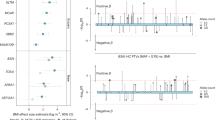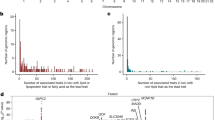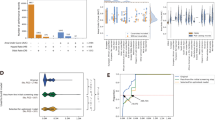Abstract
Familial Hypercholesterolemia (FH) is an autosomal, dominant, inherited disorder characterized by severely elevated LDL-cholesterol (LDL-C) levels with high risk for Coronary Artery Disease (CAD). There are limited genetic studies especially on genes other than Low Density Lipoprotein receptor (LDLR) conducted in Indian population. Thus, our aim was to screen the entire Proprotein Convertase Subtilisin/Kexin type 9 gene (PCSK9) gene & hotspot exons 3, 4 and 9 of LDLR gene in FH cases and controls. 50 FH cases were categorized into definite, probable and possible cases according to Dutch Lipid Network Criteria (DLNC) who were gender matched with 50 healthy controls. All 12 exons of PCSK9, and hotspot exons 3, 4 & 9 of LDLR gene were screened through High Resolution Melt (HRM) curve analysis. Enzyme linked immunosorbent assay was performed to measure circulating PCSK9 levels. Total cholesterol and LDL-C were significantly high in all three groups of cases. Total 8 nonpathogenic variants in exon 1, 5, 7 and 9 of the PCSK9 gene were detected. In LDLR gene, 3 known pathogenic and 1 benign variant were found in exon 3 & 4. In FH cases, PCSK9 levels were significantly high compared to controls (P = 0.0001), and were directly correlated to LDL-C (P = 0.0001) and Total Cholesterol (P = 0.0001). Our study is first to screen the entire PCSK9 gene in western part of India. Since no pathogenic variants were identified, it is possible that PCSK9 variants are clinically less relevant. However, 3 known pathogenic variants were found in the LDLR gene. These findings support our understanding of the genetic spectrum of FH in India.
This is a preview of subscription content, access via your institution
Access options
Subscribe to this journal
Receive 12 print issues and online access
$259.00 per year
only $21.58 per issue
Buy this article
- Purchase on Springer Link
- Instant access to full article PDF
Prices may be subject to local taxes which are calculated during checkout


Similar content being viewed by others
References
Hobbs H, Brown M, Goldstein J. Molecular genetics of the LDL receptor gene in familial hypercholesterolemia. Hum Mutat. 1992;1:445–66.
Goldstein J, Brown M. The LDL Receptor. Arteriosclerosis, Thrombosis, Vasc Biol. 2009;29:431–8.
Stock J. Familial hypercholesterolemia: an urgent public health priority. Atherosclerosis. 2020;308:48–49.
Austin M. Familial Hypercholesterolemia and Coronary Heart Disease: a HuGE Association Review. Am J Epidemiol. 2004;160:421–9.
Tibolla G, Norata G, Artali R, Meneghetti F, Catapano A. Proprotein convertase subtilisin/kexin type 9 (PCSK9): from structure–function relation to therapeutic inhibition. Nutr, Metab Cardiovasc Dis. 2011;21:835–43.
Chiou K, Charng M. Detection of Mutations and Large Rearrangements of the Low-Density Lipoprotein Receptor Gene in Taiwanese Patients With Familial Hypercholesterolemia. Am J Cardiol. 2010;105:1752–8.
Youngblom E, Pariani M, Knowles J. Familial Hypercholesterolemia [Internet]. Ncbi.nlm.nih.gov. 2020. https://www.ncbi.nlm.nih.gov/books/NBK174884/.
Sawhney J, Prasad S, Sharma M, et al. Prevalence of familial hypercholesterolemia in premature coronary artery disease patients admitted to a tertiary care hospital in North India. Indian Heart J. 2019;71:118–22.
Rangarajan N. Knowledge and awareness of familial hypercholesterolaemia among registered medical practitioners in tamil nadu: are they suboptimal? J Clin Diagnostic Res. 2016;10:OC52–6.
Ashavaid T, Reddy LL. Familial Hypercholesterolemia (FH) Awareness Amongst Physicians in Mumbai, India. J Assoc Phys India. 2018;66:66–9.
Ashavaid T, Kondkar A, Nair K. Identification of two LDL receptor mutations causing familial hypercholesterolemia in Indian subjects. J Clin Lab Anal. 2000;14:293–8.
ArulJothi K, Whitthall R, Futema M, et al. Molecular analysis of the LDLR gene in coronary artery disease patients from the Indian population. Clin Biochem. 2016;49:669–74.
Setia N, Saxena R, Arora A, Verma I. Spectrum of mutations in homozygous familial hypercholesterolemia in India, with four novel mutations. Atherosclerosis. 2016;255:31–6.
Kulkarni S, Basavraj S, Kadakol GTV, et al. Mutation Analysis of the LDL Receptor Gene in Indian Families with Familial Hypercholesterolemia. Asian J Med Sci. 2011;2:82–6.
Setia N, Movva S, Balakrishnan P, et al. Genetic analysis of familial hypercholesterolemia in Asian Indians: A single-center study. J Clin Lipidol. 2020;14:35–45.
Seidah N. Proprotein Convertase Subtilisin Kexin 9 (PCSK9) Inhibitors in the Treatment of Hypercholesterolemia and other Pathologies. Curr Pharm Des. 2013;19:3161–72.
Hachem A, Hariri E, Saoud P, Lteif C, Lteif L, Welty F. The Role of Proprotein Convertase Subtilisin/Kexin Type 9 (PCSK9) in Cardiovascular Homeostasis: a Non-Systematic Literature Review. Curr Cardiol Rev. 2017;13:274–82.
Chaudhary R, Garg J, Shah N, Sumner A. PCSK9 inhibitors: a new era of lipid lowering therapy. World J Cardiol. 2017;9:76.
Burnett J, Hooper A. Common and Rare Gene Variants Affecting Plasma LDL Cholesterol. Clin Biochem Rev. 2008;29:11–26.
Fruchart J. PCSK9: The functional relevance of fenofibrate–statin combination therapy to reduce residual cardiovascular risk. Int J Diabetes Mellit. 2015;3:4–10.
Hopkins P, Toth P, Ballantyne C, Rader D. Familial Hypercholesterolemias: prevalence, genetics, diagnosis and screening recommendations from the National Lipid Association Expert Panel on Familial Hypercholesterolemia. J Clin Lipidol. 2011;5:S9–17.
Miller S, Dykes D, Polesky H. A simple salting out procedure for extracting DNA from human nucleated cells. Nucleic Acids Res. 1988;16:1215.
Abifadel M, Rabès J, Devillers M, et al. Mutations and polymorphisms in the proprotein convertase subtilisin kexin 9 (PCSK9) gene in cholesterol metabolism and disease. Hum Mutat. 2009;30:520–9.
Huijgen R, Sjouke B, Vis K, et al. Genetic variation in APOB, PCSK9 and ANGPTL3 in carriers of pathogenic autosomal dominant hypercholesterolemic mutations with unexpected low LDL-C Levels. Hum Mutat. 2011;33:448–55.
Ding K, Kullo IJ. Molecular population genetics of PCSK9: a signature of recent positive selection. Pharmacogenet Genom. 2008;18:169–79.
Mayne J, Ooi TC, Raymond A, et al. Differential effects of PCSK9 loss of function variants on serum lipid and PCSK9 levels in Caucasian and African Canadian populations. Lipids Health Dis. 2013;12:70.
Chuan J, Qian Z, Zhang Y, Tong R, Peng M. The association of the PCSK9 rs562556 polymorphism with serum lipids level: a meta-analysis. Lipids Health Dis. 2019;18:105.
Cohen J, Pertsemlidis A, Kotowski I, Graham R, Garcia C, Hobbs H. Low LDL cholesterol in individuals of African descent resulting from frequent nonsense mutations in PCSK9. Nat Genet. 2005;37:161–5.
Futema M, Whittall R, Kiley A, et al. Analysis of the frequency and spectrum of mutations recognized to cause familial hypercholesterolemia in routine clinical practice in a UK specialist hospital lipid clinic. Atherosclerosis. 2013;229:161–8.
Dubuc G, Chamberland A, Wassef H, et al. Statins upregulate PCSK9, the gene encoding the proprotein convertase neural apoptosis-regulated convertase-1 implicated in familial hypercholesterolemia. Arterioscler Thromb Vasc Biol. 2004;24:1454–9.
Nozue T. Lipid Lowering Therapy and Circulating PCSK9 Concentration. J Atherosclerosis Thrombosis. 2017;24:895–907.
Jeong HJ, Lee HS, Kim KS, Kim YK, Yoon D, Park SW. Sterol-dependent regulation of proprotein convertase subtilisin/kexin type 9 expression by sterol-regulatory element binding protein-2. J Lipid Res. 2008;49:399–409.
Lambert G, Charlton F, Rye KA, Piper DE. Molecular basis of PCSK9 function. Atherosclerosis. 2009;203:1–7.
Kadam P, Ashavaid T, Ponde C, Rajani R. Genetic determinants of lipid-lowering response to atorvastatin therapy in an Indian population. J Clin Pharm Ther. 2016;41:329–33.
Mayne J, Dewpura T, Raymond A, et al. Plasma PCSK9 levels are significantly modified by statins and fibrates in humans. Lipids Health Dis. 2008;7:22.
Guo YL, Liu J, Xu RX, et al. Short-term impact of low-dose atorvastatin on serum proprotein convertase subtilisin/kexin type 9. Clin Drug Investig. 2013;33:877–83.
Welder G, Zineh I, Pacanowski MA, Troutt JS, Cao G, Konrad RJ. High-dose atorvastatin causes a rapid sustained increase in human serum PCSK9 and disrupts its correlation with LDL cholesterol. J Lipid Res. 2010;51:2714–21.
Laurie A, Spain R, Reid N, George P. Investigation of the Origin of Common LDLR Mutation Alleles in New Zealand Familial Hypercholesterolemia Patients. J Genetic Disord Genetic Rep. 2018;7:1.
Wang J, Huff E, Janecka L, Hegele R. Low density lipoprotein receptor (LDLR) gene mutations in Canadian subjects with familial hypercholesterolemia, but not of French descent. Hum Mutat. 2001;18:359.
Mozas P, Castillo S, Tejedor D, et al. Molecular characterization of familial hypercholesterolemia in Spain: identification of 39 novel and 77 recurrent mutations in LDLR. Hum Mutat. 2004;24:187.
Humphries S, Whittall R, Hubbart C, et al. Genetic causes of familial hypercholesterolaemia in patients in the UK: relation to plasma lipid levels and coronary heart disease risk. J Med Genet. 2006;43:943–9.
Webb J, Sun X, Knight B, Soutar A. Identification of new mutations in the low density lipoprotein genes of english patients with familial hypercholesterolemia. Atherosclerosis. 1993;98:120.
Al-Khateeb A, Zahri M, Mohamed M, et al. Analysis of sequence variations in low-density lipoprotein receptor gene among Malaysian patients with familial hypercholesterolemia. BMC Med Genet. 2011;12:40.
Jensen H, Jensen L, Hansen P, Færgeman O, Gregersen N. Two point mutations (313 + 1G→A and 313 + 1G→T) in the splice donor site of intron 3 of the low-density lipoprotein receptor gene are associated with familial hypercholesterolemia. Hum Mutat. 1996;7:269–71.
Pek S, Dissanayake S, Fong J, et al. Spectrum of mutations in index patients with familial hypercholesterolemia in Singapore: Single center study. Atherosclerosis. 2018;269:106–16.
Hooper A, Nguyen L, Burnett J, et al. Genetic analysis of familial hypercholesterolaemia in Western Australia. Atherosclerosis. 2012;224:430–4.
Sun X, Patel D, Bhatnagar D, Knight B, Soutar A. Characterization of a Splice-Site Mutation in the Gene for the LDL Receptor Associated With an Unpredictably Severe Clinical Phenotype in English Patients With Heterozygous FH. Arteriosclerosis, Thrombosis, Vasc Biol. 1995;15:219–27.
Chmara M, Kubalska J, Bednarska-Makaruk M, et al. Molecular characterization of polish patients with familial hypercholesterolemia: novel and recurrent LDLR gene mutations. Atherosclerosis Suppl. 2008;9:111.
Lek M, Karczewski K, Minikel E, et al. Analysis of protein-coding genetic variation in 60,706 humans. Nature. 2016;536:285–91.
Tatishcheva A, Mandelshtam M, GoluBkov V, Lipovetskii B. Four New Mutations and Polymorphic Variants of the Low Density Lipoprotein Receptor in Patients with Familial Hypercholesterolemia in Saint Petersburg. Russ J Genet. 2001;39:1290–5.
Acknowledgements
National Health Education Society (NHES), P. D Hinduja Hospital and Medical Research Centre and European Atherosclerosis Society – Familial Hypercholesterolemia Studies Collaboration (EAS-FHSC).
Author information
Authors and Affiliations
Corresponding author
Ethics declarations
Conflict of interest
The authors declare no competing interests.
Additional information
Publisher’s note Springer Nature remains neutral with regard to jurisdictional claims in published maps and institutional affiliations.
Supplementary information
Rights and permissions
About this article
Cite this article
Reddy, L.L., Shah, S.A.V., Ponde, C.K. et al. Screening of PCSK9 and LDLR genetic variants in Familial Hypercholesterolemia (FH) patients in India. J Hum Genet 66, 983–993 (2021). https://doi.org/10.1038/s10038-021-00924-y
Received:
Revised:
Accepted:
Published:
Issue Date:
DOI: https://doi.org/10.1038/s10038-021-00924-y



